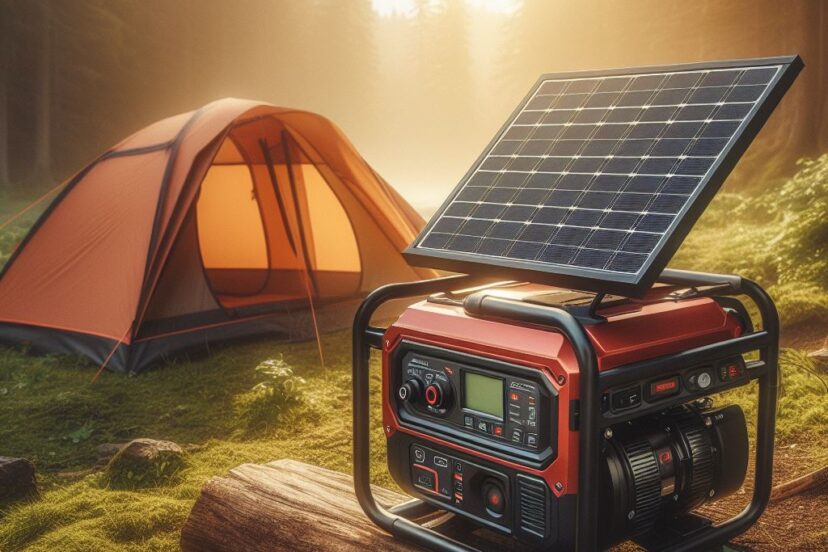Camping Generator: Powering Outdoor Adventures
*We may earn a commission for purchases made using our links. Please see our disclosure to learn more.
Camping Generator Essentials: Choosing Reliable Power for the Outdoors
Camping offers an escape into nature, but modern explorers often find themselves in need of electricity to power devices such as smartphones, cooking appliances, or lighting systems. A portable camping generator can bridge this gap between the rustic and the modern, by providing a convenient source of power even when off the grid. These compact, portable units are designed to be carried along on outdoor adventures, ensuring that necessities and small comforts are always within reach.
When selecting a camping generator, portability, power output, and fuel type are key considerations. Smaller generators are easier to transport but may offer limited power, suitable only for charging phones or powering small appliances. Larger generators can accommodate more demanding electrical needs but at the expense of increased weight and reduced portability. Fuel options typically include gasoline, propane, or battery-powered generators, each with its own advantages and potential drawbacks in terms of availability, running time, and environmental impact.
The right camping generator strikes a balance between sufficient power output and ease of transportation, while also considering the environmental ethics of the campsite and the longevity of the unit. I meticulously analyzed a range of models to ensure that the recommendation would reflect a pragmatic blend of these essential traits, providing a harmonious addition to any camping setup. Through comprehensive research, I have identified exceptional camping generators that cater to diverse outdoor electricity needs, ensuring your focus remains on the immersive natural experience rather than on the logistics of power supply.
Top Camping Generators
In my quest for reliable off-grid power, I’ve exhaustively researched and evaluated numerous camping generators. The subsequent list represents the cream of the crop, providing a range of options to suit various needs, from lightweight, portable models for backpackers to larger, more robust units for family camping trips. These generators stand out for their efficiency, durability, and user-friendly features, ensuring that you can maintain the comforts of home wherever your adventure leads.
MARBERO Power Companion
I highly recommend this portable generator for its compact size and versatility which can make any camping trip more convenient and enjoyable.
Pros
- Ultra-portable design makes it perfect for on-the-go power.
- Multipurpose output ports cater to a variety of charging needs.
- Built-in emergency light with different modes can be incredibly handy.
Cons
- Limited power capacity may not suit high-energy devices for long.
- Solar panel for charging is not included, an additional purchase is necessary.
- May not power demanding appliances like a space heater adequately.
I recently took my MARBERO Power Companion on a weekend camping trip, and I must say it was a game changer. Its lightweight form factor meant I could easily slip it into my backpack without it being a burden during the hike. At night, the built-in flashlight with adjustable brightness was just what I needed to navigate my way around the campsite without waking up the entire group.
The variety of charging ports is another feature I found extremely practical. I could keep my phone, tablet, and camera all charged up. Even my friend’s CPAP machine ran without a hitch through the night, proving that the MARBERO Power Companion is not just about convenience but also about peace of mind.
One setback I noticed was when a fellow camper needed to charge her small space heater—the generator couldn’t handle it. It’s important to recognize that while the MARBERO Power Companion is a robust little device, it won’t replace a full-sized generator for powering heavy-duty equipment.
Overall, my experience with this generator was positive. It streamlined all of my charging needs without the hassle of a bulky unit, and even during a sudden power outage at home, it came to the rescue. Just remember to invest in a compatible solar panel if constant, renewable power is what you’re after while you’re out in the wilderness.
GRECELL 330W Power Station
I would recommend the GRECELL 330W Power Station for its reliable performance and versatility in various outdoor scenarios.
Pros
- Ample power for most camping electronics
- Multiple recharging methods including solar
- Compact and lightweight for easy transport
Cons
- Maximum wattage capacity might limit the use of some high-power devices
- Accommodates only one AC-powered device at a time
- Cooling fans can be audible during operation, depending on the environment and sensitivity to noise
Just returning from a camping trip where the GRECELL 330W Power Station was my main power source, I found it impressively compact yet robust enough to keep my gear charged. It supported my phone, camera, and laptop effortlessly with its 288Wh capacity. The pure sine wave output made me confident in the safety of my electronics.
Its adaptability struck me; whether recharging from the car on the drive or hooking it up to a solar panel at the campsite, it bounced back to full charge without a hitch. The built-in MPPT controller seemed highly efficient, making the most of the available sunlight.
Running multiple devices simultaneously was a breeze, thanks to the variety of outputs. Juggling between charging USB devices and powering a small fan was seamless. However, the single AC outlet meant I had to prioritize which larger device to plug in. Despite this, its performance out in the wilderness was a camping game-changer, assuring me power without the noise or fumes of a gas generator.
FlashFish 200W Power Station
Based on my recent camping experience, I can say this compact power station is a reliable ally for anyone needing off-grid power, despite a few minor drawbacks.
Pros
- Versatile with multiple charging outputs for various devices
- Light and portable, making it ideal for travel and outdoor activities
- Features an informative LCD display for convenient monitoring of power status
Cons
- Battery cannot be charged while simultaneously powering devices
- The capacity might be insufficient for more energy-intensive needs
- It lacks solar panels, necessitating a separate purchase for solar charging capability
The FlashFish power station accompanied me on a weekend camping trip, and its lightweight design meant carrying it was a breeze. The multiple outputs came in handy for charging my phone, camera, and even powering a small fan, all without hassle. The intuitive LCD display kept me updated on the battery’s status, which added to the ease of use when electricity was sparse under the stars.
I noticed that I had to plan my charging sessions since the power station can’t be charged while being used—a minor inconvenience, but one to keep in mind to ensure all your gear is powered when needed. During a longer excursion, the capacity might not sustain high-drain devices over several days, but for a weekend getaway, it proved more than sufficient.
Lastly, the absence of included solar panels means there’s an additional cost if you prefer to charge it sustainably via sunlight. Nevertheless, the option to hook it up to a solar setup adds a layer of versatility that I appreciate for longer trips off the beaten path.
In conclusion, the FlashFish 200W Power Station is a handy and easy-to-transport source of power that proved invaluable during my outdoor adventures. While it may need separate arrangements for solar charging and isn’t suitable for charging while in use, its portability and variety of outputs render it a solid choice for casual campers and travelers alike.
Jackery Explorer 1000
I highly recommend the Jackery Explorer 1000 for anyone needing a reliable and powerful energy source while camping or during power outages.
Pros
- Environmentally-friendly solar charging option.
- Extremely user-friendly and quick to set up.
- Sturdy build and safety features provide peace of mind.
Cons
- Solar panels must be purchased separately.
- On the pricier side compared to some competitors.
- Heavier build hinders portability.
In my recent camping trip, the Jackery Explorer 1000 was an absolute workhorse. With an easy grip handle, moving it from my truck to the campsite was a breeze. The one-touch power button meant I was soon up and running, charging devices, and running a mini cooler. Efficiency was key; this unit didn’t disappoint.
Solar charging was a dream during my trip. Although the need to buy the SolarSaga 100W panels separately was felt, the eco-friendly option added a lot of value. As long as the sun was shining, my Explorer 1000 was charging. Come nightfall, its charged state kept my gear powered.
The power station impressed me with its versatility. While the USB ports kept my phone and tablet charged, the 110V AC outlets ensured my heavier duty equipment ran without a hiccup. Its robust design held up perfectly when an unexpected wind shook my campsite, attesting to its durability.
PowerSmart Quiet Inverter
The PowerSmart Quiet Inverter is a solid choice for campers who value both tranquility and portability in their outdoor adventures.
Pros
- Exceptional quietness for uninterrupted conversations
- Lightweight design makes transportation effortless
- Multiple power outlets cater to a variety of electronic needs
Cons
- Louder than anticipated under heavy loads
- Occasional manufacturer defects may occur
- Limited power capacity for larger appliances
I recently had the opportunity to take the PowerSmart Quiet Inverter on a camping trip, and it was a game-changer. It blended into the background noise seamlessly, almost like it wasn’t there. Weighing just 39 pounds, moving it around was a breeze, and I appreciated the variety of ports that kept all my devices charged up.
During use, the generator confirmed its power efficiency, lasting throughout the evening on a single tank. Switching it to economy mode extended the run time further, perfect for overnight energy conservation. Low oil shutdown gave me peace of mind, knowing the unit would protect itself without my constant vigilance.
One catch, though, was when I pushed the generator harder. It got a tad noisier, disrupting the peacefulness of the campsite. Also, I heard about some units arriving with defects, but thankfully, mine was in perfect working order. Lastly, its power output was adequate for my needs, but if you’re planning to run heavy-duty appliances, it might not suffice.
Overall, the PowerSmart Quiet Inverter’s performance was impressive. It’s a great fit for most camping needs and the quiet operation makes it an even more attractive option for power without the disturbance.
Camping Generator – Buying Guide
Understanding Power Requirements
Before choosing a camping generator, I first assess my power needs. I consider the total wattage of the devices I’ll be using, adding extra wattage to account for starting surges in electronics like refrigerators.
- Portable Generators: Typically range from 1,000 to 7,000 watts.
- Inverter Generators: Generally offer cleaner power for sensitive electronics.
Camping Generator Fuel Efficiency and Type
I look for generators that balance fuel efficiency with run time. Generators can run on various fuels, but the most common for camping are:
- Gasoline: Readily available but has a shorter shelf life.
- Propane: Stores well and burns clean but may offer less power.
- Diesel: Efficient but less common for portable models.
Size and Portability
When considering size and portability, I think about the generator’s weight and whether it has features like carry handles or wheels.
- Weight: Lighter units are easier to carry but may have less power.
- Handles/Wheels: Improve maneuverability, specially for heavier models.
Noise Level
Since I value a peaceful camping experience, I pay attention to the noise level, measured in decibels (dB).
- Standard Generators: Range from 55 – 75 dB.
- Quieter Models: 50 dB or less.
Additional Features for a Camping Generator
Lastly, I check for features that provide convenience and safety:
- Multiple Outlets: Ensure I can plug in several devices.
- USB Ports: Useful for charging phones or tablets.
- Eco-Mode: Reduces noise and saves fuel.
- Low-Oil Shutoff: Protects the engine from damage.
FAQs About Your Camping Generator
In this section, I address common inquiries about camping generators, focusing on size, type, noise levels, renting versus buying, the benefits of solar options, and assessing the suitability of lightweight generators for your needs.
1. What size generator is necessary for powering typical camping equipment?
For most camping equipment, a generator between 1,000 to 2,000 watts will suffice. It’s enough to power basic conveniences like lighting, a small fridge, and charging for electronic devices.
2. Which type of portable generator is most suitable for a camping trip?
Inverter generators are generally most suitable for camping due to their portability, quieter operation, and the clean power they provide, which is safe for sensitive electronics like smartphones and laptops.
3. Are quiet generators for camping significantly more beneficial than regular ones?
Yes, quiet generators are beneficial as they reduce the noise pollution in the camping area, enhancing the outdoor experience for me and those around me. They also comply with noise regulations often found in campgrounds.
4. Is it more advantageous to rent a camping generator or purchase one?
Renting a camping generator can be advantageous for infrequent campers to save on cost and storage space. However, those who camp regularly may find purchasing a generator to be more cost-effective in the long run.
5. What are the benefits of solar generators for camping over traditional gas generators?
Solar generators are silent, emit no fumes, and require minimal maintenance compared to gas generators. They’re an environmentally friendly option that uses renewable energy, ideal for camping in sunny locations.
6. How to determine if a lightweight camping generator will meet your specific needs?
To determine if a lightweight camping generator is sufficient, I calculate the total wattage of the appliances I plan to use and ensure the generator can meet this demand while being easy to transport and set up.









